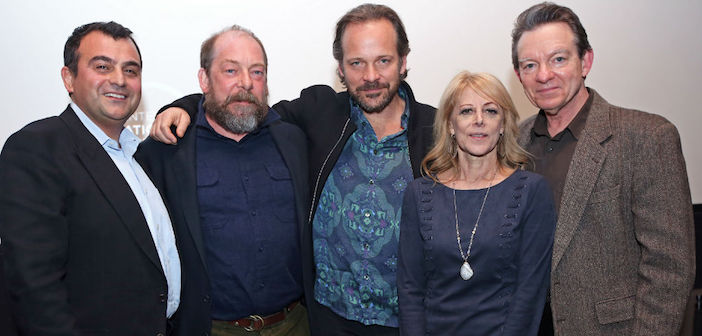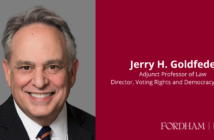Fordham’s Center on National Security hosted an advance screening and panel discussion celebrating Hulu’s new 9/11 drama, The Looming Tower, on Feb. 22 at the Film Society of Lincoln Center’s Francesca Beale Theater.
The Looming Tower, a 10-episode limited series debuting on Wednesday, Feb. 28, is based on journalist Lawrence Wright’s Pulitzer Prize-winning book, The Looming Tower: Al-Qaeda and the Road to 9/11. Directed by Academy Award-winning documentarian Alex Gibney, the series’ pilot episode introduces viewers to U.S. intelligence officials and agents, including then-FBI agent Ali Soufan, as they seek information on Al-Qaeda operations in the build-up to the 1998 U.S. embassy bombings in Tanzania and Kenya that killed 224 people.
Wright, who co-created the series, and Soufan have been longtime friends of the Center on National Security, sharing their knowledge to help the Center in its mission to educate the American and global public about 9/11 and how it has shaped our thinking as a nation, Center Director Karen J. Greenberg informed the audience during her panel introductions. In addition to Wright and Soufan, two of the series’ actors, Peter Sarsgaard and Bill Camp, participated on the panel.
“American citizens have been deprived of learning the story of 9/11 partly because we’ve never tried the individuals in U.S. custody who were the masterminds of 9/11,” Greenberg said after the pilot episode’s credits finished. “So we don’t have that story – the narrative the trial would give us. In the absence of that, we have this series, and that might be all we will ever have.”
For years, Wright turned down offers to make his book, first published in 2006, into a TV or film project. His apprehension, he said, revolved around the question of how to deal with such hallowed subject matter in a respectful manner using a medium that is sometimes not respectful. Wright praised Hulu for staying true to its word to finance what amounted to a “500-minute movie” shot in New York, South Africa, and Morocco.
Encounters with young people, for whom 9/11 was not part of their lived experience, ultimately drove Wright to tackle the TV series.
“They live in a post-9/11 world but what led to it is a mystery to them,” Wright explained. “They don’t know why they’re living in the America they’re living in now, and they don’t know much about America before 9/11. So we wanted to provide them with a narrative that would give them a sense of the sweep of history and why these things happened and why we failed to stop 9/11.”
“That’s why we start with the embassy bombings,” Wright continued. “This was a drumroll leading up to 9/11. It wasn’t a single incident.”
Soufan, who led the investigation into the bombing of the U.S.S. Cole in 2000 and into the events surrounding 9/11, shared Wright’s initial hesitance to participate in the show’s creation. Telling this story on Hulu now is “extremely essential” to provide Americans the first step toward closure with regard to 9/11, he shared.
“Hopefully we can move forward, wrap our heads around it, turn the page, have closure, and face the dangers we face today,” said Soufan, who told the audience he views the cybersecurity threat from Russia—and the reluctance of the Trump administration to take meaningful action to stop future offenses—as reminiscent of events prior to 9/11.
Failure to talk about the past dooms America to repeat its past mistakes, Soufan noted.
“That’s why you have no accountability for 9/11, then you have no accountability for the Iraq War, then no accountability for torture. Now hopefully we’ll have accountability for Russia. Otherwise we won’t have America anymore,” Soufan concluded.
Photos by Bruce Gilbert.







